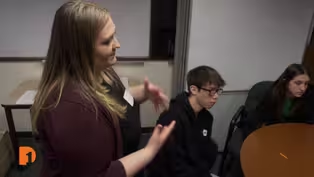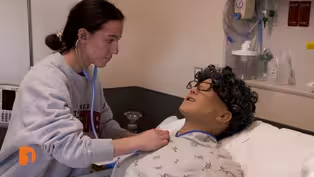
FDA approves new gene therapies for sickle cell disease
Clip: Season 8 Episode 34 | 8m 11sVideo has Closed Captions
The FDA approves two groundbreaking new gene therapy treatments for sickle cell disease.
Two groundbreaking new gene therapies have been approved by the U.S. Food and Drug Administration as a treatment option for sickle cell disease. Dr. Melissa Creary, assistant professor at the University of Michigan’s School of Public Health, sits down with contributor Stephen Henderson to talk about the pros and cons of the new gene-editing therapy.
Problems playing video? | Closed Captioning Feedback
Problems playing video? | Closed Captioning Feedback
One Detroit is a local public television program presented by Detroit PBS

FDA approves new gene therapies for sickle cell disease
Clip: Season 8 Episode 34 | 8m 11sVideo has Closed Captions
Two groundbreaking new gene therapies have been approved by the U.S. Food and Drug Administration as a treatment option for sickle cell disease. Dr. Melissa Creary, assistant professor at the University of Michigan’s School of Public Health, sits down with contributor Stephen Henderson to talk about the pros and cons of the new gene-editing therapy.
Problems playing video? | Closed Captioning Feedback
How to Watch One Detroit
One Detroit is available to stream on pbs.org and the free PBS App, available on iPhone, Apple TV, Android TV, Android smartphones, Amazon Fire TV, Amazon Fire Tablet, Roku, Samsung Smart TV, and Vizio.
Providing Support for PBS.org
Learn Moreabout PBS online sponsorship- [Host] More than 100,000 Americans, most of whom are black, are living with sickle cell disease.
Recently the Food and Drug Administration approved two types of groundbreaking gene therapies to treat the debilitating pain caused by the blood disorder.
It's the first time gene editing has been used to improve a human illness.
"American Black Journal" host and "One Detroit" contributor Stephen Henderson spoke with Dr. Melissa Creary, a social scientist and assistant professor in the University of Michigan School of Public Health, about the breakthrough treatment.
- Means that there's a disruption of the gene.
(ambient music) - So I am fascinated by this news and fascinated by the possibilities that it suggests.
Let's start with what this actually is and what effects it can have for people who struggle with sickle cell anemia.
- Sure.
Sickle cell disease is the most common inherited blood disorder, and it impacts mostly those that are descendants of the African diaspora, Black Americans and Caribbeans.
And so it's a disease that it's pretty debilitating.
And so when we're thinking about the potential for gene therapy and what it can do for the population, it's a really exciting day.
- So explain to me what this is and how it works and why it's such an advance in the way to treat this disease.
- Absolutely.
So in December, the FDA approved the clearance for two gene therapies to be released to market for people to begin to think about taking as part of their therapy and care for sickle cell disease.
And there are two types.
One is called Lovo-cel, one is called Exa-cel.
Both of these involve taking your own cells and kind of altering them.
They involve chemotherapy, they involve long times at the hospital, but that alteration means that either your own stem cells are re-engineered for one of them, or for the other one, it means that there's a disruption of the gene that causes the sickling.
And by disrupting that gene, you're allowing fetal hemoglobin, which basically creates really healthy buoyant red cells to be produced.
In both of these cases, both of these gene therapies, an assumed cure is happening, because brand new cells are going to be generated, brand new healthy red blood cells will be generated.
- Yeah, and this is my understanding at least, is that this is part of medical science that is being used to change the way we treat lots of different diseases.
This idea that essentially altering what's going on with your own stem cells or your own genes is the way to treat, or in some cases cure diseases that have confounded us for a really long time.
- There's a lot of excitement I think, in the scientific world, about this for this very promise.
And I think that yes, we can think about the ways that this gets applied to many diseases.
for CRISPR in particular, the exa-cel that I mentioned earlier, this is the first, they created this technology with sickle cell disease in mind to kind of pave the way for how other diseases will kind of follow suit.
And so there's this large idea about why and how we are going to address a particular population, a population that's been through a lot of medical neglect, and then give them this innovation, I think as a way to kind of counteract that historical neglect that's been happening.
- Yeah, I absolutely know about the frustration with the medical establishment in coming up with ways to treat it.
Just like for other health outcomes and issues for African Americans, this has been, I think, the right word is neglected.
- Absolutely.
I think that there's just been this long history of inequities that we have seen as it has played out in the sickle cell population, which I think can be connected directly to institutional and structural racism that we find in all of our systems, particularly our healthcare system, and the way that we think about the production of knowledge, the way that we think about how science gets developed.
All these things are interconnected.
I am hopeful that this is just the start and a way forward of how we can actually pay attention to this historical neglect.
I am concerned about this kind of idea of a scientific piece of justice being applied to a population that needs a lot more attention when it comes to this historical neglect and this historical kind of experience with inequities.
We can't just say, here's a brand new innovation, and then expect everything else to kind of fall in place.
- Right, right.
And there are some other concerns around the use of this, and again, the distribution and the access to it.
- Absolutely.
One of the main questions we have ask ourselves is, countered with this excitement we have about this therapy is who exactly is going to get access to this therapy?
In Michigan, there is only one site that's going to be offering it, and that's the children's hospital which is in Detroit.
And besides this physical location of accessibility, we also have to think about financial accessibility and this much larger kind of ecosystem of support that's needed.
These therapies are ranging between one and $3 million and we haven't yet figured out exactly who's going to pay for what.
- So I also wanna give you a chance to talk personally about this.
I understand you're someone who lives with sickle cell disease.
First, how do you feel like this might affect you, but also give us a sense of what it's like to live with this disease under the circumstances that we've had before this discovery.
- Yeah, I think it's hard to fully grasp what it's like.
And I will say that I'm a professor at the University of Michigan.
I'm living in a certain amount of privilege.
And I, despite all of that privilege, am exposed to pain almost every day.
And that is the main hallmark, the symptomatic hallmark of sickle cell is pain.
So the idea that a therapy like this can take away pain really impacts your everyday positioning in life.
Everything that you do when you're living with sickle cell is measured on how much pain you might have access to, how much pain you might experience in a given situation.
And the idea of being untethered to that pain offers an amount of freedom that I really can't fully fathom.
One Detroit Weekend: February 23, 2024
Video has Closed Captions
Clip: S8 Ep34 | 2m 14s | Eight ways to celebrate Black History Month and more in and around Detroit this weekend. (2m 14s)
Turning Point teaches teens about dating violence in schools
Video has Closed Captions
Clip: S8 Ep34 | 5m 56s | A new law will require all Michigan schools to teach consent and sexual assault awareness. (5m 56s)
University of Detroit Mercy launches STAR Center
Video has Closed Captions
Clip: S8 Ep34 | 6m 43s | University of Detroit Mercy opens the STAR Center training facility for nursing students. (6m 43s)
Providing Support for PBS.org
Learn Moreabout PBS online sponsorship
- News and Public Affairs

Top journalists deliver compelling original analysis of the hour's headlines.

- News and Public Affairs

FRONTLINE is investigative journalism that questions, explains and changes our world.












Support for PBS provided by:
One Detroit is a local public television program presented by Detroit PBS


